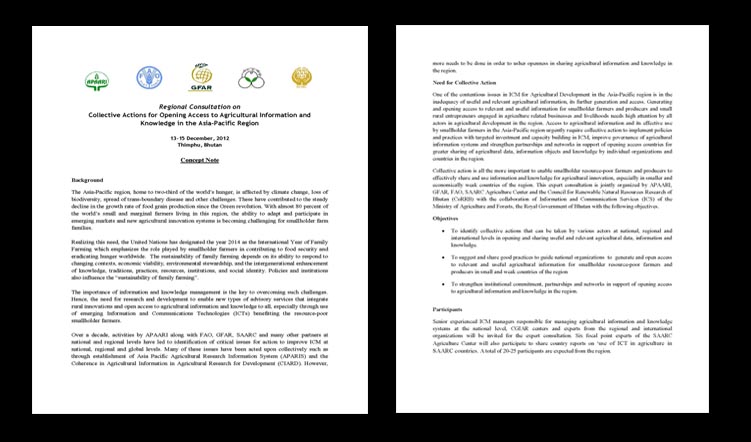Jointly organized by APAARI, FAO, GFAR, CoRRB, ICS and SAARC Agriculture Center
Concept Note
Background
The Asia-Pacific region, home to two-third of the world’s hunger, is affected by climate change, loss of biodiversity, spread of trans-boundary disease and other challenges. These have contributed to the steady decline in the growth rate of food grain production since the Green revolution. With almost 80 percent of the world’s small and marginal farmers living in this region, the ability to adapt and participate in emerging markets and new agricultural innovation systems is becoming challenging for smallholder farm families.
Realizing this need, the United Nations has designated the year 2014 as the International Year of Family Farming which emphasizes the role played by smallholder farmers in contributing to food security and eradicating hunger worldwide. The sustainability of family farming depends on its ability to respond to changing contexts, economic viability, environmental stewardship, and the intergenerational enhancement of knowledge, traditions, practices, resources, institutions, and social identity. Policies and institutions also influence the “sustainability of family farming”.
The importance of information and knowledge management is the key to overcoming such challenges. Hence, the need for research and development to enable new types of advisory services that integrate rural innovations and open access to agricultural information and knowledge to all, especially through use of emerging Information and Communications Technologies (ICTs) benefitting the resource-poor smallholder farmers.
Over a decade, activities by APAARI along with FAO, GFAR, SAARC and many other partners at national and regional levels have led to identification of critical issues for action to improve ICM at national, regional and global levels. Many of these issues have been acted upon collectively such as through establishment of Asia Pacific Agricultural Research Information System (APARIS) and the Coherence in Agricultural Information in Agricultural Research for Development (CIARD). However, more needs to be done in order to usher openness in sharing agricultural information and knowledge in the region.
Need for Collective Action
One of the contentious issues in ICM for Agricultural Development in the Asia-Pacific region is in the inadequacy of useful and relevant agricultural information, its further generation and access. Generating and opening access to relevant and useful information for smallholder farmers and producers and small rural entrepreneurs engaged in agriculture related businesses and livelihoods needs high attention by all actors in agricultural development in the region. Access to agricultural information and its effective use by smallholder farmers in the Asia-Pacific region urgently require collective action to implement policies and practices with targeted investment and capacity building in ICM, improve governance of agricultural information systems and strengthen partnerships and networks in support of opening access countries for greater sharing of agricultural data, information objects and knowledge by individual organizations and countries in the region.
Collective action is all the more important to enable smallholder resource-poor farmers and producers to effectively share and use information and knowledge for agricultural innovation, especially in smaller and economically weak countries of the region. This expert consultation is jointly organized by APAARI, GFAR, FAO, SAARC Agriculture Center and the Council for Renewable Natural Resources Research of Bhutan (CoRRB) with the collaboration of Information and Communication Services (ICS) of the Ministry of Agriculture and Forests, the Royal Government of Bhutan with the following objectives.
Objectives
To identify collective actions that can be taken by various actors at national, regional and international levels in opening and sharing useful and relevant agricultural data, information and knowledge.
To suggest and share good practices to guide national organizations to generate and open access to relevant and useful agricultural information for smallholder resource-poor farmers and producers in small and weak countries of the region
To strengthen institutional commitment, partnerships and networks in support of opening access to agricultural information and knowledge in the region.
Participants
Senior experienced ICM managers responsible for managing agricultural information and knowledge systems at the national level, CGIAR centers and experts from the regional and international organizations will be invited for the expert consultation. Six focal point experts of the SAARC Agriculture Center will also participate to share country reports on ‘use of ICT in agriculture in SAARC countries. A total of 20-25 participants are expected from the region.
Download:
Consultation on Collective Actions Concept Note (2119 downloads)
Consultation on Collective Actions Tentative Program (2199 downloads)
Consultation on Collective Actions Instructions to Participants (2355 downloads)
Visa Application Form for Kingdom of Bhutan (2008 downloads)


